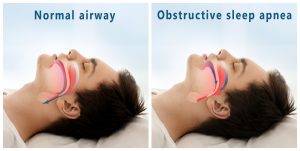Is Obstructive Sleep Apnea on the Rise?
June 10, 2022
 If you have noticed more people are being diagnosed with sleep apnea, you aren’t imagining things. Research has found that 100 million people around the world suffer from sleep apnea; however, it is believed that 80% of cases haven’t been diagnosed. Data published by the American Journal of Epidemiology has found that rates of obstructive sleep apnea (OSA) cases have steadily increased over the past 2 decades, but what’s behind the spike in diagnoses? Here’s what you need to know about the rising cases of OSA and what you can do to safeguard your health.
If you have noticed more people are being diagnosed with sleep apnea, you aren’t imagining things. Research has found that 100 million people around the world suffer from sleep apnea; however, it is believed that 80% of cases haven’t been diagnosed. Data published by the American Journal of Epidemiology has found that rates of obstructive sleep apnea (OSA) cases have steadily increased over the past 2 decades, but what’s behind the spike in diagnoses? Here’s what you need to know about the rising cases of OSA and what you can do to safeguard your health.
What is Obstructive Sleep Apnea?
OSA is a breathing-related sleep disorder that can affect anyone, but it is more prevalent among men. The condition causes breathing disturbances from an obstruction in the airway that results from the tongue or soft tissues in the back of the mouth collapsing. It can cause hundreds of interruptions in breathing each night, depleting your body of oxygen and interrupting your sleep cycle. Although the most common symptom of the disorder is chronic snoring, OSA can have life-threatening consequences without any treatment.
Why is Sleep Apnea on the Rise?
Various factors are attributed to the increased number of sleep apnea cases, like enhanced public and medical awareness; however, the American Journal of Epidemiology reports that obesity is also a leading cause.
Although anyone can develop sleep apnea, certain risk factors increase the likeliness, such as obesity and type 2 diabetes. More than 70 million adults in the U.S. are obese while 9.4% of the American population has type 2 diabetes. Research has found that 45% of people with obesity and 48% of patients with type 2 diabetes have sleep apnea. Overall, researchers believe 86% of obese and type 2 diabetic patients have sleep apnea, but many aren’t aware they have the condition because of the diversity of symptoms, which can include:
- Daytime fatigue
- Morning headaches
- Loud, chronic snoring
- Difficulty with concentration or memory
- Waking choking or gasping for air
- Depression or irritability
- Decreased sex drive or function
- Sleep deprivation
Is There a Cure for Sleep Apnea?
A healthy lifestyle and weight can improve sleep apnea symptoms; however, they aren’t a substitute for traditional treatment. Based on the results of a sleep study, your physician will recommend sleep apnea therapy, which may include:
- CPAP: A steady stream of air pressure is delivered through a mask worn over the mouth or nose to keep the airway open.
- Oral Appliance: A custom-fit appliance repositions the lower jaw or tongue to prevent an obstruction in the airway.
Don’t ignore the signs of sleep apnea. With the right diagnosis and treatment, you can sleep peacefully knowing you are protecting your health and wellness with sleep apnea therapy.
About Dr. Bernard L. Greenbaum
Dr. Greenbaum earned his dental degree from the Georgetown University School of Dentistry and has completed advanced education in many specialties, including sleep apnea and snoring treatment. As a member of the American Board of Dental Sleep Medicine, he has the qualifications you can trust. Contact our office today to schedule your consultation for sleep apnea therapy.
